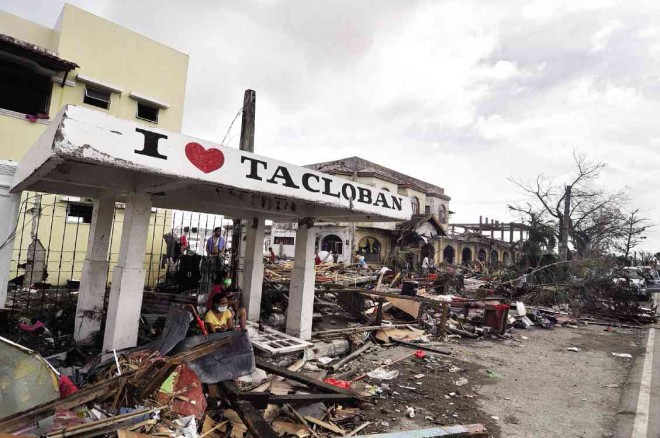Gov’t data: ‘Yolanda’ stunts growth of Visayas regions

SCENE in Tacloban City a few hours after Supertyphoon “Yolanda” (international name: Haiyan) struck RICHARD A. REYES
ILOILO CITY—The devastation brought by Supertyphoon “Yolanda” (international name: Haiyan) continues to stunt economic growth in two regions, Western and Eastern Visayas, which suffered the brunt of the most powerful storm to ever hit land, according to a government economic report on Thursday.
According to the report released by the Philippine Statistics Authority, the gross regional domestic product (GRDP) growth of Western Visayas went up slightly from 3.4 percent in 2013 to 4.9 percent in 2014, which could be a sign of recovery.
But while the GRDP growth of Western Visayas had been the fastest in recent years, it paled in comparison with its growth target of 5.9 percent and growth rates of 6.7 percent in 2011 and 7 percent in 2012.
Eastern Visayas, which suffered the most casualties and damage in the Nov. 8, 2013 supertyphoon, continued to reel from the devastation with its economy contracting from 4.5 percent in 2013 to 2.3 percent in 2014.
The GRDP measures the total amount of goods produced and services delivered in a region in a year and serves as a main economic performance indicator.
Article continues after this advertisementWorst hit
Article continues after this advertisementThe two regions were among the worst hit by Yolanda which destroyed or damaged hundreds of thousands of houses and other structures. Yolanda, which carried winds reaching 300 kilometers per hour, also devastated the fishing and poultry sectors as many fishing boats and gear, fishponds and livestock were lost.
But while the northern municipalities of Cebu were also devastated by the supertyphoon, economic growth in Central Visayas accelerated from 7.4 percent in 2013 to
8.8 percent last year.
Ma. Teresa Guadalupe, chief economic development specialist of the National Economic Development Authority in Western Visayas, said the region is still reeling from the effects of Yolanda even as some areas in the region are now recovering.
The growth of the industrial sector in Western Visayas posted a significant increase from 9.6 percent in 2013 to 14 percent in 2014. The bulk of the growth came from mining and quarrying—from 5.1 percent in 2013 to 15.2 percent in 2014.
Construction also contributed to the growth from 13.3 percent in 2013 to 17.3 percent last year.
The growth in the industrial sector was, however, stunted by continued decline in production in agriculture, hunting, forestry and fishery sector which further fell from 3.5 percent to 2.4 percent.
Guadalupe said with a more stable business environment this year, the region’s economic growth is expected to surpass the 5.9 percent target.
A main economic growth driver is the vibrant construction sector especially those involving private and government infrastructure projects in Iloilo and Capiz provinces.
BPO industry
The business process outsourcing (BPO) industry is also fast growing with more than 20 BPO companies in Iloilo as of January 2015, based on data from the Iloilo Federation for Information Technology.
Iloilo has 10,390 full time BPO employees with an estimated 5,000 call center employees needed every year, according to Guadalupe.